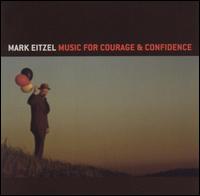

In a culture where we are barraged with merciless, unending waves of escapist crap, singer/songwriter Mark Eitzel is one of few artists left who can smack you upside the head with the beauty and pain of real life. His gorgeous, honey-sweet baritone and sarcastic, starkly depressing poetry was the centerpiece of the legendary group American Music Club, one of the greatest and most under-appreciated bands of the last 20 years.
Music For Courage & Confidence is Eitzel’s fifth solo effort. A collection of perfectly chosen cover songs, it cements the singer as the Sinatra of self-consciousness, putting some spins on old favorites that were begging for the full Eitzel treatment. He injects a wounded gorgeousness to the slow, R&B groove of Kris Kristofferson’s “Help Me Make It Through The Night” and the whispery blues of Billie Holiday’s “I’ll Be Seeing You.” “Do You Really Want To Hurt Me” becomes something darker and sweeter than the Culture Club ever imagined it could be.
Given all of this, the album is by no means a downer. Eitzel is backed by an excellent band of session players, including drummer Joey Waronker and Beck bassist Justin Meldal-Johnson. The group shines on the Fender Rhodes-driven funk of the Bill Withers jam “Ain’t No Sunshine” and the horn-happy, hot buttered soul of Curtis Mayfield’s “Move On Up.”
As usual, Eitzel displays many layers of human temperament, this time by choosing 10 songs that touch on a variety of emotions, from life’s heaviest moments to its occasional beams of joy.
Practically any time an artist does a good cover, people say that they “made it their own.” But that’s not always a compliment (Rod Stewart has made many covers “his own”). Eitzel surely owns the songs on Music, Courage & Confidence, filtering them through his prism of painful perceptiveness and reserved musical genius. He’s a loving stepfather to these compositions, resulting in an album that is the best, most truthful collection of songs that the young year has seen.
Appeared in Issue Two, 2002, of Traffic East.